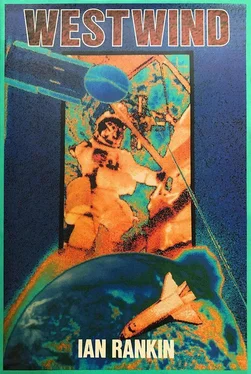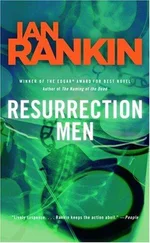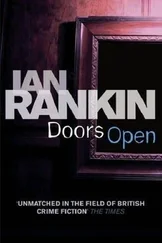‘Do you always eavesdrop on people’s conversations?’ asked Dreyfuss.
‘Goes with the territory, I’m afraid. So how are you?’
‘Fine.’
‘Yes, for the moment perhaps. But everyone around you seems ever so slightly agitated. I shouldn’t think your safety here could be guaranteed for much longer. What do you say?’
‘You mean I can leave?’
‘Well of course you can leave. Nobody’s been forcing you to stay.’
Dreyfuss groaned.
‘Unless, of course,’ Parfit said, ‘they got you to sign any papers.’
‘What kind of papers?’
‘Papers committing yourself to their care?’
‘I haven’t signed anything.’
‘You’re sure?’
‘Positive.’
‘Very well then. I’ll just make a few arrangements, and then we’ll have you out of here.’
‘Have you told them I’m leaving?’
‘Who?’ Parfit seemed amused. ‘Esterhazy and Stewart? Good Lord, it’s not up to them, is it? It’s up to the doctors and the hospital administrator. I foresee no problem.’
‘They won’t be very happy.’
If anything, Parfit’s smile broadened. ‘No,’ he said, ‘no, they won’t, will they?’
He was about to leave, but Dreyfuss stopped him.
‘One question, Parfit,’ he said.
‘Yes?’
‘What took you so long to get here?’
‘We’ll talk about that elsewhere,’ Parfit said, looking around the room. His meaning was clear: walls really do have ears. Dreyfuss nodded. Parfit again turned to leave.
‘Parfit?’
‘Yes, Major Dreyfuss?’
Dreyfuss was smiling too. ‘It’s nice to see you again,’ he said.
Cam Devereux arrived at London’s Heathrow Airport desperately tired and in need of the vacation this was supposed to be. His cotton sports shirt was sticking to him, and his scalp tingled as he ran his hands over his thinning hair. He was so tired. But how could he rest? His mind felt inflamed. How could he stop himself replaying events, seeing that stranger arrive at the ground base control room? Seeing the stranger given an office of his own and a console, ignoring the curious looks of the other controllers? Seeing Argos itself gliding erratically towards earth, flailing across the runway...?
Yes, he needed a vacation. They’d told him that. He needed a complete break; everybody did, everybody connected with Argos . They had ordered him to take a break. So he had chosen to come to London, despite their protests about leaving Europe well alone. London was a city he could happily get lost in, and wander through all day from district to district. He liked almost everything about it, including the things the Londoners themselves seemed to loathe, such as the subway system. So, having waited for his baggage, he headed downwards, beneath the ground, far away from the sunlight and the sky, and bought a ticket to Green Park station, from where it would be only a short walk to his hotel. The other people who got into his compartment of the Tube train were travellers like himself, hauling too much baggage behind them. He himself was travelling light by comparison. You could always buy what you hadn’t brought, especially with the thick wallet of travellers’ cheques they had given him.
‘Look on it as a bonus,’ they had said. A bonus for what? he was tempted to ask. But he had never questioned anything in his life... until now. Now, his head was full of unanswered questions and fears. He again examined his fellow passengers, and saw that they looked every bit as nervous as he felt. First-timers in London, he supposed, and wary of every step.
Maybe at last he could stop looking over his shoulder. Maybe he could stop worrying about what he had seen, what they seemed to know he had seen. And had paid him to forget about, paid him by way of a holiday, a swanky hotel, a plastic wallet full of paper money. Maybe they’d leave him alone. And maybe when he stopped worrying, he’d stop thinking about it too.
Maybe, but he doubted it.
Still, he had to make it look like a holiday. He would visit a few of the sights, do a little shopping. All the time waiting for his new controller to make contact. He had asked for one, and they had agreed to his request, though reluctantly. But he had negotiated from a position of strength. He had information after all, didn’t he? He had something to tell. If only he knew what it was...
The morning was bright, despite Martin Hepton’s mood. He awakened to his clock radio, just in time to catch a studio debate between someone from the Pentagon and the Minister for Defence turning into a full-scale shouting match. The radio presenter sounded genuinely alarmed as accusations were hurled across the table. Lack of co-operation, distinct misunderstanding of the mood of the European Community, defenders not terrorists, never asked to be here in the first place. Et cetera.
Hepton smiled to himself as he listened. If intelligence and communications were good enough, he reasoned, there would be no arms race: everyone would know what everyone else had. That was why he felt no jab of conscience at his job, even when attacked at parties by people who could not understand why he did what he did. Not that he did very much. There would be the occasional full-scale surveillance operation, covering the movements of a suspected spy or some military attaché. Someone in a car might just notice that another car was following, but they couldn’t suspect that they were being watched from space. Mostly these jobs were for the security services. Now and again they were for the military. There had been illicit peeks at what this or that US listening post was up to; the one at Menwith Hill, for example. Against the rules, of course. Snooping on the enemy was all well and good, but spying on your allies...
Maybe that was why NATO was in such a shambles. European countries were squabbling with each other. America was pulling its defences out and retrenching back in its homeland. A ring of steel was going up around the USA: not just missiles and tanks and manpower, but economic steel and the steel of mistrust. The USA could be self-sufficient if it wished, and that was the way things were headed. Companies were finding it harder to export their goods to the States. Diplomacy had about it the air of the refrigerator. What had gone wrong? Just over a year ago, Hepton had been delighted with the way the world was going. The EuroGreens were keeping things sane as far as the environment went, the left wing of the European Parliament was pushing through some worthwhile legislation. The mood was distinctly upbeat. Even Britain was becoming more... well, European.
So what had happened? Hepton had blinked and the edifice had started to crumble: squabbles, economic downturns, the troubles in Pakistan and Turkey... And now the pull-out. He fumbled for the radio’s off-switch and made for the shower. Standing beneath the spray, he thought of the dream he’d had in the night. Mike Dreyfuss had been in it. So had Jilly. They’d been seeking each other, finding each other, but then losing each other again.
When he came out of the shower, he heard the telephone ringing. He ran, naked, to the living room and picked up the receiver.
‘Hello?’
‘Martin? Is that you? Thank Christ I’ve found you. I tried at the base but they said you were on leave.’
It was Paul Vincent, sounding edgy. No, more than that, sounding frightened.
‘Where are you?’
‘I’m still at the nursing home. I’ve been trying to reach you.’
‘What’s wrong, Paul?’
‘They’ve got guards watching me, Martin. I mean, they watch me all the time. I can’t stand it. They said I could leave soon, but I think they’re planning something, God knows what. Please, come and get me, Martin. I want out of here.’
Читать дальше












